10 Foods That Will Completely Turn Your Health Around in 2024
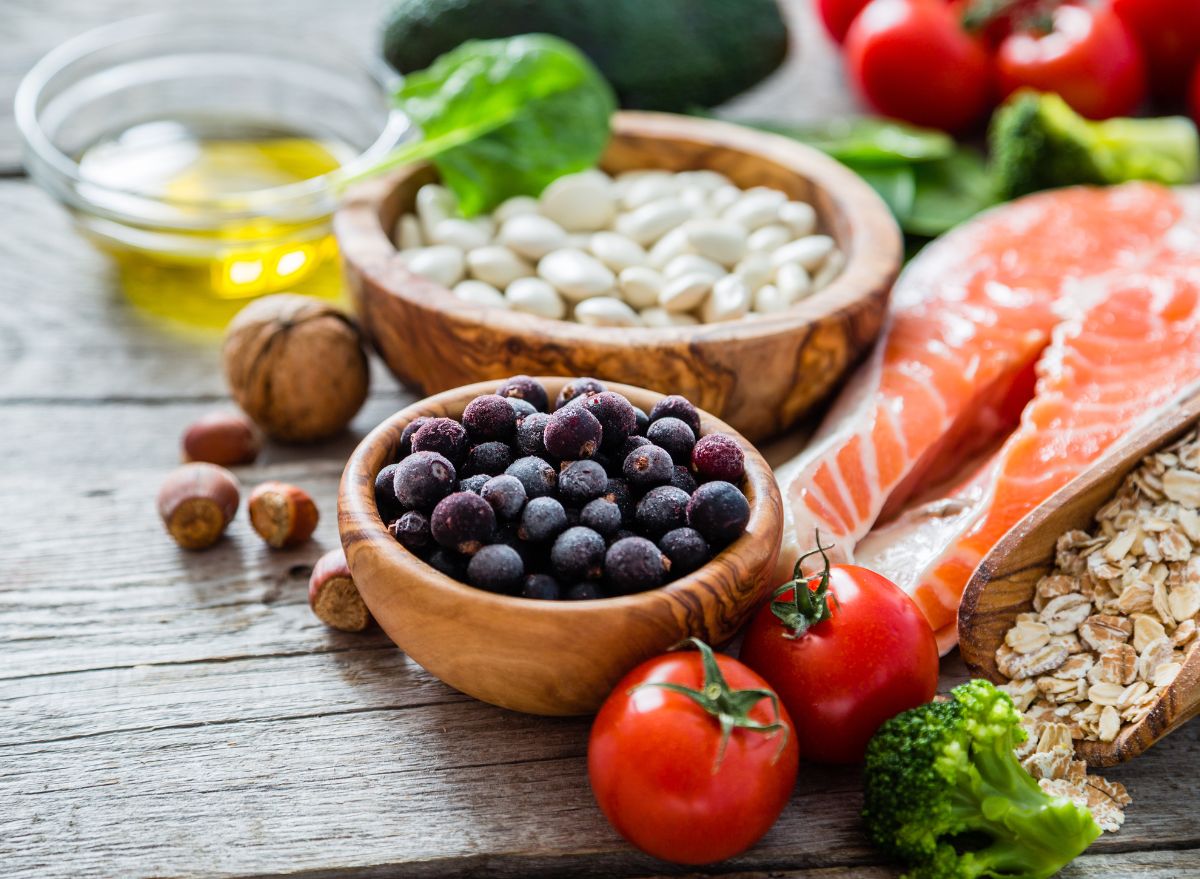
If the “New Year, New You” mentality has you working out seven days a week and restricting your favorite foods (only to fall off the wagon a few weeks in), 2024 may be the year to try something different. Dietitians agree that the biggest health changes often come from what you add to your diet, not what you take away.
While no one food can make or break your health, including more nutrient-dense foods that are high in antioxidants, fiber, lean protein, and essential micronutrients can make a significant difference in your health and how you feel each day. Whether you’re trying to lower your cholesterol, maintain or manage a healthy weight, reduce your blood sugar, boost your immune system, or just feel more energized each day, the foods you regularly eat can help you reach your goals.
Here are 10 foods dietitians want you to eat more of to turn your health around in the new year. Read on, and for more healthy eating tips, check out the 20 Best High-Protein, Low-Calorie Foods.
Beans
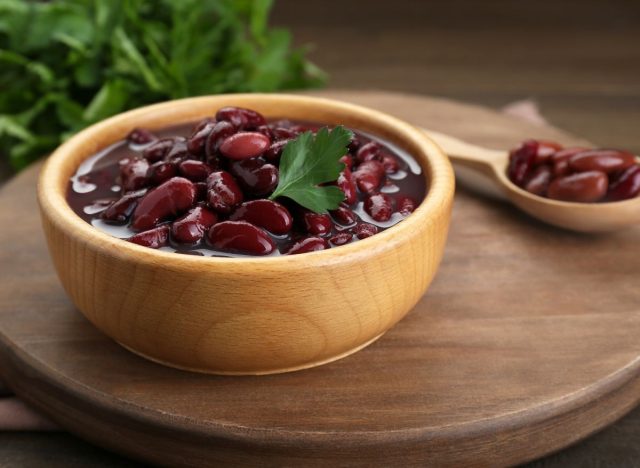
“Adding a serving or two of beans each day may make a significant impact on the diet by adding nutrients such as iron, magnesium, and folate,” says Sarah Pflugradt, MS, RDN, CSCS. You get plenty of protein and fiber from beans, making them a great addition to anyone trying to eat more plants in their diet. Just one-half cup of black beans has 7.5 grams of protein and 7.5 grams of fiber.
“Regular bean consumption has also been shown to improve glucose control and lower cholesterol,” Pflugradt adds. In a 2021 study in the Journal of Nutrition, people with high LDL-cholesterol reduced their total and LDL-cholesterol by eating 1 cup of beans (any variety) daily for four weeks.
Oats
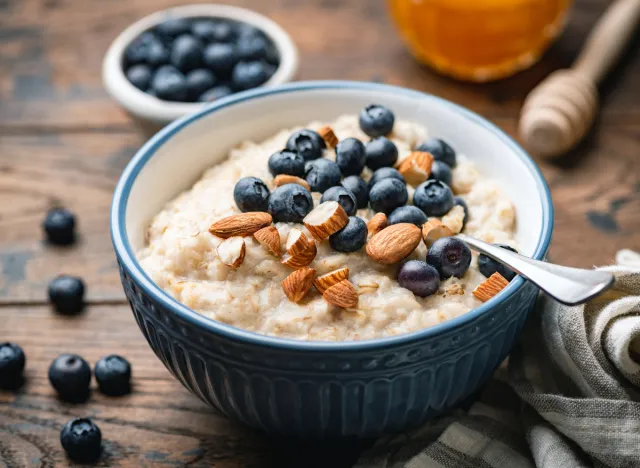
“Oats are budget-friendly, shelf-stable, and versatile, which makes them a highly accessible food for overall health,” says Wan Na Chun (she/her), RDN, a registered dietitian nutritionist and nutrition consultant for Health Insiders.
Whether you enjoy them as hot oats, overnight oats, granola, or baked into muffins and breads, eating more oats can make a big difference. While they’re a good source of nutrients like iron and magnesium, their star nutrient is soluble fiber. “Oats are rich in soluble fiber, which can help lower cholesterol, stabilize blood sugar levels, and reduce the risk of heart disease,” Chun adds.
Nuts
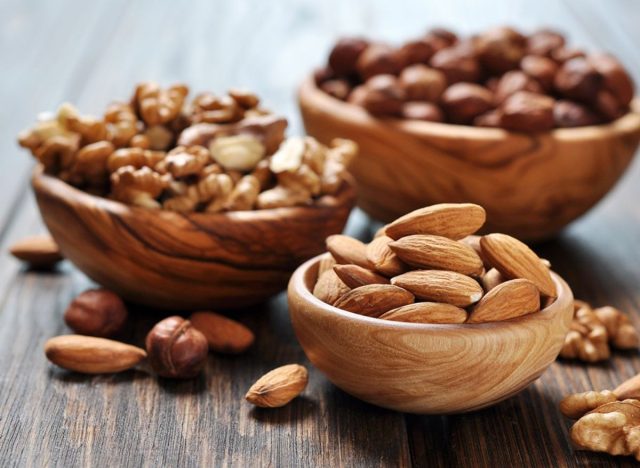
“Whether it’s walnuts, almonds, peanuts, or pistachios, nuts are a great source of fiber and plant-based protein,” says Patricia Kolesa MS, RDN, owner of Dietitian Dish LLC. Just one ounce of almonds (about a small handful) has 6 grams of protein and 3.5 grams of fiber, and is a good source of magnesium, copper, and riboflavin.
“While some people are concerned about eating nuts due to them being high in calories, I encourage them as a great snack,” says Bess Berger, RD, a registered dietitian specializing in PCOS and menopause at Nutrition by Bess.
In fact, a 2019 review of the diets, health, and weight of almost 145,000 adults found that an increased intake of nuts by just 0.5 servings per day resulted in lower rates of obesity and weight gain over the 20-24 years that participants were followed.
Seaweed
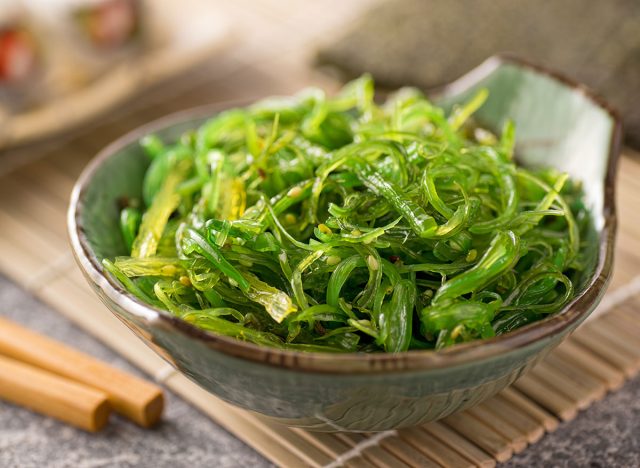
“Seaweed packs a lot of health power into a low-calorie food item,” says Amy Bene, MS RD CDCES, owner of Nutrition Insights PLLC.
There are plenty of types of seaweed to enjoy, from dried spirulina to kelp or nori, which is used in many Asian cuisines. Seaweed is a good source of various vitamins, minerals, protein, fiber, and antioxidants while being low in fat and calories.
If this is a new-to-you food and you’re unsure how to incorporate it, there are plenty of opportunities to try it. “Seaweed is often served with sushi, in miso soup, prepared dried as a snack or added to many different recipes including stir fry’s or wraps,” Beney adds.
You can also find packages of dried seaweed “chips” in many grocery stores or online for healthier snacking.
Berries
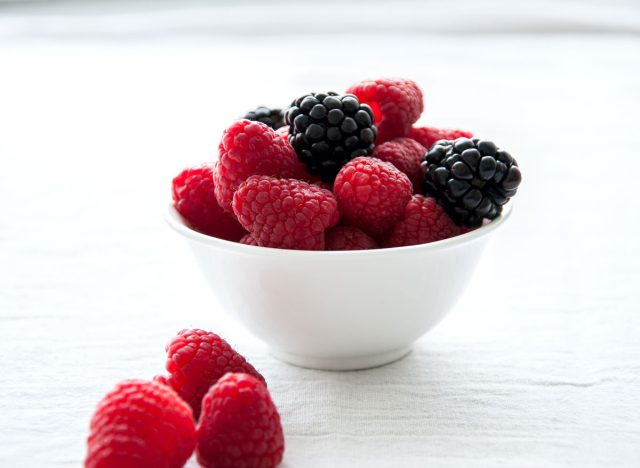
By the handful, added to cereal, over toast, or mashed into a jam, eating more berries is good for your health. “Not only are berries packed with immune-boosting vitamin C and high in fiber, they are also loaded with antioxidants,” says Danielle VenHuizen, RD, a Seattle-based registered dietitian and owner of Food Sense Nutrition.
“Berries may boost mood and reduce anxiety, which can have a profound effect on overall health,” VenHuizen adds. One possible reason berries have such a significant impact on mood is their high flavonoid content. Small studies have found that just a cup of berries had a positive effect on executive function (a term that describes working memory, planning, problem-solving, and directing attention, thoughts, and behaviors) in children and young adults.
Kale
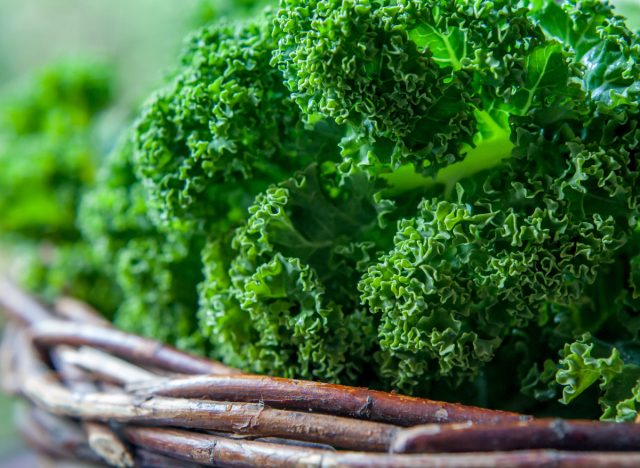
“Eating kale and other green leafy vegetables daily may reduce your risk of dementia,” says Lisa Andrews, MEd, RD, LD.
Leafy greens are rich in nutrients like lutein, folate, β-carotene, and phylloquinone, which have neuroprotective effects to help slow down age-related cognitive declines. Just one serving a day could keep your mind sharp as you age.
Tuna fish
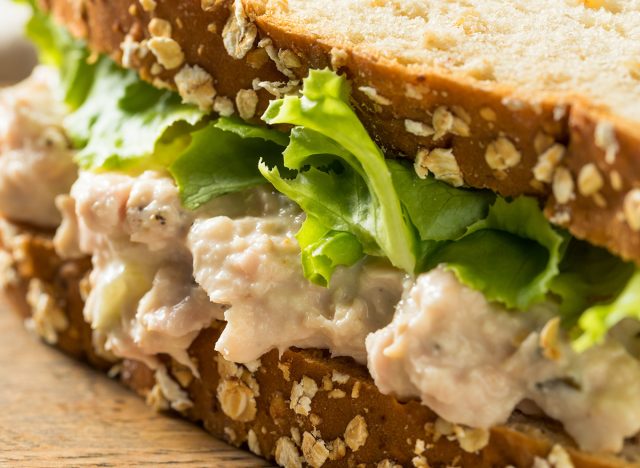
“To boost your memory, keep your vision sharp, and decrease your risk for heart disease, try having fatty fish (like salmon or tuna) two times per week,” says Chelsea LeBlanc, RDN, LD, a Nashville-based dietitian and owner of Chelsea LeBlanc Nutrition.
Diets high in omega-3 fatty acids from fish can help reduce the risk of heart disease, leading the American Heart Association to recommend at least two 3.5-ounce servings of fish, preferably fatty fish, to your diet. Most adults fall short of these recommendations, but meeting this goal is actually pretty easy.
“It can be as simple as adding lox to your avocado toast, tuna to your salad, or making a simple sheet pan salmon,” LeBlanc adds.
Watercress
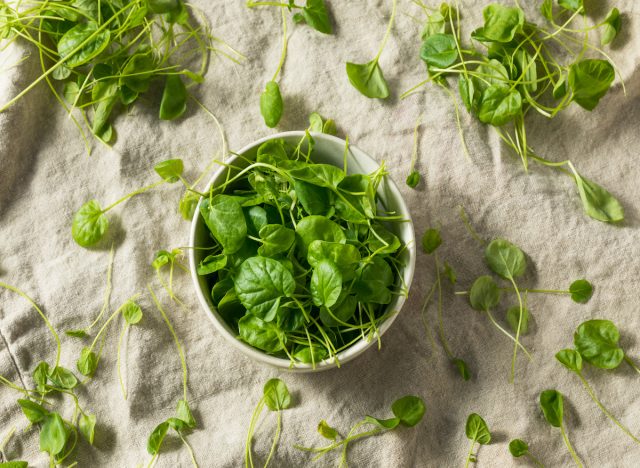
“Watercress has many plant compounds, including one called Phenethyl isothiocyanate (PEITC), which may have anti-cancer properties,” says Lauren Manaker MS, RDN, LD. This leafy green may not be as common as kale or spinach, but it has a peppery flavor that complements a wide variety of meals, and the flavor becomes milder once cooked. Add this green to salads, soups, stir-fries, sandwiches, or blend it into a delicious pesto.
Yogurt
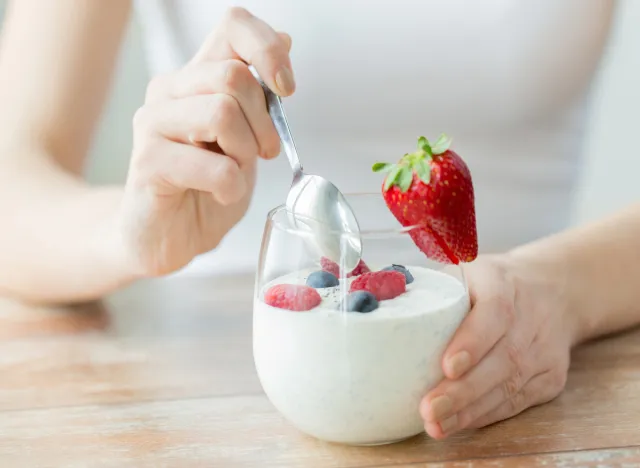
Eating more yogurt, especially low-sugar and high-protein varieties that include live active cultures, can have a significant impact on your health. A 2020 review found that diets high in fermented milk, like yogurt, are associated with a lower risk of breast and colon cancer and type 2 diabetes, as well as healthier weight and improved heart, bone, and gastrointestinal health.
Eat it on its own as a snack, use it as a dip for apples or bananas, add it to smoothies, or start your morning with a berry, granola, and yogurt parfait!
Water

“Many times people feel drained or sluggish, and sometimes the reason is due to dehydration,” says Alyssa Smolen MS RDN, NJ-based content creator dietitian. The solution? Drink more water. While not a food, water still made our list because of how important it is.
“Water helps maintain temperature, helps get rid of waste, and contributes to electrolyte balance,” Smolen adds. She recommends getting a new water bottle you’ll want to carry with you and incorporating sparkling or flavored waters like LaCroix or Spindrift to increase intake and satisfaction.
- Source: Doma KM, Dolinar KF, Dan Ramdath D, Wolever TMS, Duncan AM. Canned Beans Decrease Serum Total and LDL Cholesterol in Adults with Elevated LDL Cholesterol in a 4-wk Multicenter, Randomized, Crossover Study. J Nutr. 2021 Dec 3;151(12):3701-3709. doi: 10.1093/jn/nxab323. PMID: 34642756.
- Source: FoodData Central. (n.d.-b). https://fdc.nal.usda.gov/fdc-app.html#/food-details/170567/nutrients
- Source: Liu X, Li Y, Guasch-Ferré M, et al Changes in nut consumption influence long-term weight change in US men and women BMJ Nutrition, Prevention & Health 2019;2:doi: 10.1136/bmjnph-2019-000034
- Source: Lomartire S, Marques JC, Gonçalves AMM. An Overview to the Health Benefits of Seaweeds Consumption. Mar Drugs. 2021 Jun 15;19(6):341. doi: 10.3390/md19060341. PMID: 34203804; PMCID: PMC8232781.
- Source: Khalid S, Barfoot KL, May G, Lamport DJ, Reynolds SA, Williams CM. Effects of Acute Blueberry Flavonoids on Mood in Children and Young Adults. Nutrients. 2017 Feb 20;9(2):158. doi: 10.3390/nu9020158. PMID: 28230732; PMCID: PMC5331589.
- Source: Morris MC, Wang Y, Barnes LL, Bennett DA, Dawson-Hughes B, Booth SL. Nutrients and bioactives in green leafy vegetables and cognitive decline: Prospective study. Neurology. 2018 Jan 16;90(3):e214-e222. doi: 10.1212/WNL.0000000000004815. Epub 2017 Dec 20. PMID: 29263222; PMCID: PMC5772164.
- Source: Papanikolaou Y, Brooks J, Reider C, Fulgoni VL 3rd. U.S. adults are not meeting recommended levels for fish and omega-3 fatty acid intake: results of an analysis using observational data from NHANES 2003-2008. Nutr J. 2014 Apr 2;13:31. doi: 10.1186/1475-2891-13-31. Erratum in: Nutr J. 2014;13:64. PMID: 24694001; PMCID: PMC3992162.
- Source: Fish and omega-3 fatty acids. (2023, October 9). www.heart.org. https://www.heart.org/en/healthy-living/healthy-eating/eat-smart/fats/fish-and-omega-3-fatty-acids
- Source: Savaiano DA, Hutkins RW. Yogurt, cultured fermented milk, and health: a systematic review. Nutr Rev. 2021 Apr 7;79(5):599-614. doi: 10.1093/nutrit/nuaa013. PMID: 32447398; PMCID: PMC8579104.









